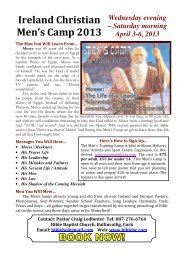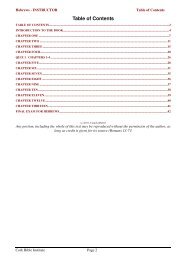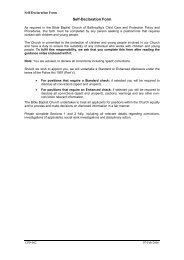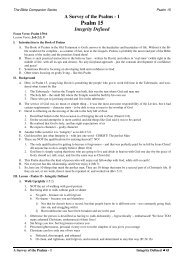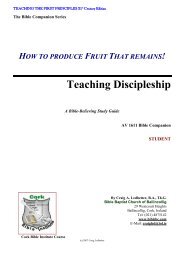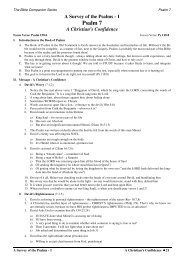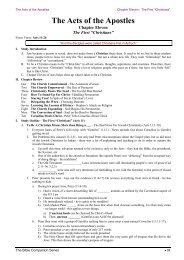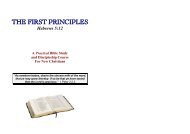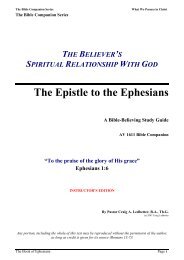An Introduction to Argumentation and Debate - Bible Baptist Church
An Introduction to Argumentation and Debate - Bible Baptist Church
An Introduction to Argumentation and Debate - Bible Baptist Church
You also want an ePaper? Increase the reach of your titles
YUMPU automatically turns print PDFs into web optimized ePapers that Google loves.
<strong>Argumentation</strong> <strong>and</strong> <strong>Debate</strong>II. Logic Already ExistsLogic <strong>and</strong> Thinking SkillsA. One important thing <strong>to</strong> underst<strong>and</strong> about logic is that we humans have only discovered, notinvented it. Logic exists ~ because God created our world in an orderly way <strong>and</strong> created usin His image as rational beings. Thus, when we define logic <strong>and</strong> the rules that govern itspractice, we are really just discovering <strong>and</strong> using what God created for us <strong>to</strong> discover <strong>and</strong>use.B. The form <strong>and</strong> structure of logic were systematized by ancient Greek philosophers,particularly __________________.1. Aris<strong>to</strong>tle categorized logic in<strong>to</strong> two basic types: ______________ logic <strong>and</strong>______________ logic. Both kinds of logic are important for the debater <strong>to</strong> underst<strong>and</strong>.a. INDUCTIVE LOGIC is the process of reasoning from particular observations ofthe world <strong>to</strong> discover probable universal truths.b. DEDUCTIVE LOGIC, on the other h<strong>and</strong>, is based on mathematical structures <strong>and</strong>involves the process of reasoning from universal statements (or premises) that lead<strong>to</strong> certain truth when the structures are properly followed. <strong>Debate</strong>rs tend <strong>to</strong> rely oninductive logic more heavily than deductive logic, especially in policy debate.2. Inductive logic lends itself well <strong>to</strong> studies of politics <strong>and</strong> human behaviour (as in policydebate), while deductive logic is better used when dealing with philosophical concepts(as in value debate).III. INDUCTIVE LOGICA. Inductive logic is the process of reasoning from particular observations <strong>to</strong> general truths.1. For example, suppose you go <strong>to</strong> a grocery s<strong>to</strong>re in the next <strong>to</strong>wn <strong>to</strong> buy a few items thatyou need. While there, you notice that the items cost less than in the s<strong>to</strong>re in your <strong>to</strong>wn.Therefore, you conclude that the s<strong>to</strong>re in the next <strong>to</strong>wn is cheaper than the s<strong>to</strong>re in yourown <strong>to</strong>wn.2. Your conclusion is only probable, rather than certain, because it is based on only oneinstance, only a few items, <strong>and</strong> only your observation. You have come <strong>to</strong> a conclusionabout the whole (the grocery s<strong>to</strong>res) based upon the observation of one particularinstance (one shopping trip for a few items).B. Inductive logic begins with what we observe <strong>to</strong> be true in particular instances <strong>and</strong> then usesthose observations <strong>to</strong> form conclusions about universal principles. __________,____________________, social studies, <strong>and</strong> scientific reasoning all fall in<strong>to</strong> the category ofinductive logic because they involve forming universal conclusions based on observing anumber of particular instances. However, it is usually not possible <strong>to</strong> observe every singleinstance when investigating scientific, social, <strong>and</strong> political truths. Unless you can observeevery single instance of a particular phenomenon or count every single item you arestudying, you can only make probable rather than perfect conclusions.1. Let’s say you are studying frogs. You observe that all of the frogs in your pond love <strong>to</strong>eat flies. Therefore, you conclude that all frogs love <strong>to</strong> eat flies.2. Your conclusion is only probable rather than certain because you have not observedevery single frog in the world.C. In general, the greater the number of observations, the greater the probability that theconclusion will be true.1. Polls ask questions of 1,000 people <strong>to</strong> make a conclusion about how the entire countrywill vote in a presidential election.Page 15





